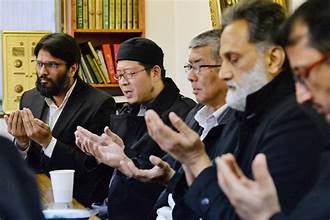Japan, known for its unique cultural tapestry, is home to a diverse range of religious beliefs and practices. Among its minority groups, Muslims, who constitute less than 1% of Japan’s 120 million population, face unique challenges due to their religious practices, particularly regarding funeral rites. This article delves into the struggles and adaptations of the Muslim community in a predominantly Buddhist and Shinto society.
The Islamic Community in Japan: A Demographic Overview
The Muslim population in Japan, estimated at around 200,000 individuals, is a vivid mosaic of cultures and traditions. Predominantly from South Asian, Middle Eastern, and Southeast Asian backgrounds, these Muslims have been integrating into Japanese society while trying to maintain their religious identity.
Adhering to Islamic Funeral Rites in a Non-Muslim Majority Country
In Islam, cremation is prohibited, and the deceased must be buried within 24 hours of death. This practice starkly contrasts with the Buddhist and Shinto tradition of cremation, followed by 99% of the Japanese population. The Muslim community’s adherence to burial can pose logistical challenges, often requiring long-distance travel to find a suitable burial ground.
Personal Narratives: The Muslim Experience in Japan
Dr. Tahir Abbas Khan, a Pakistani-born Japanese citizen who arrived in Japan in 2001 for his Ph.D., exemplifies the emotional and practical difficulties faced by Muslims in Japan. “The thought of not being able to perform a dignified funeral for my loved ones haunts my nights,” he shares, highlighting the deep emotional impact of these cultural and religious differences.
The Journey to Establish Muslim Cemeteries
In 2009, the first mosque in Oita Prefecture, on Kyushu Island, was established, marking a significant step for the Muslim community. However, efforts to establish a dedicated Muslim cemetery in the region have met with challenges, reflecting the broader struggle of the community to secure spaces for their religious practices.
Mohammad Iqbal Khan’s story is particularly poignant. After moving from Pakistan to Japan in 2004, he faced a harrowing ordeal when his wife gave birth to a stillborn child. With no Muslim cemetery nearby, they had to transport the body nearly 1,000 kilometers to Yamanashi Cemetery, a facility used by Muslims and Christians alike. This journey underscores the logistical and emotional hardships faced by Muslims in Japan.
The Minority Within a Minority: Christians in Japan
The Christian community in Japan, also constituting about 1% of the population, shares some of these challenges. They, too, utilize facilities like Yamanashi Cemetery, indicating a shared experience among religious minorities in Japan.
The Road Ahead: Integration and Acceptance
The experiences of the Muslim community in Japan highlight the challenges faced by religious minorities in maintaining their traditions within a different cultural context. It also reflects on the broader themes of cultural integration, religious freedom, and the importance of understanding and respecting diverse practices.
As Japan continues to evolve as a multicultural society, the experiences of its Muslim population offer valuable insights into the complexities of cultural and religious coexistence. The journey of Muslims in Japan is not just about maintaining their religious practices but also about fostering a deeper understanding and acceptance within the broader Japanese society.




